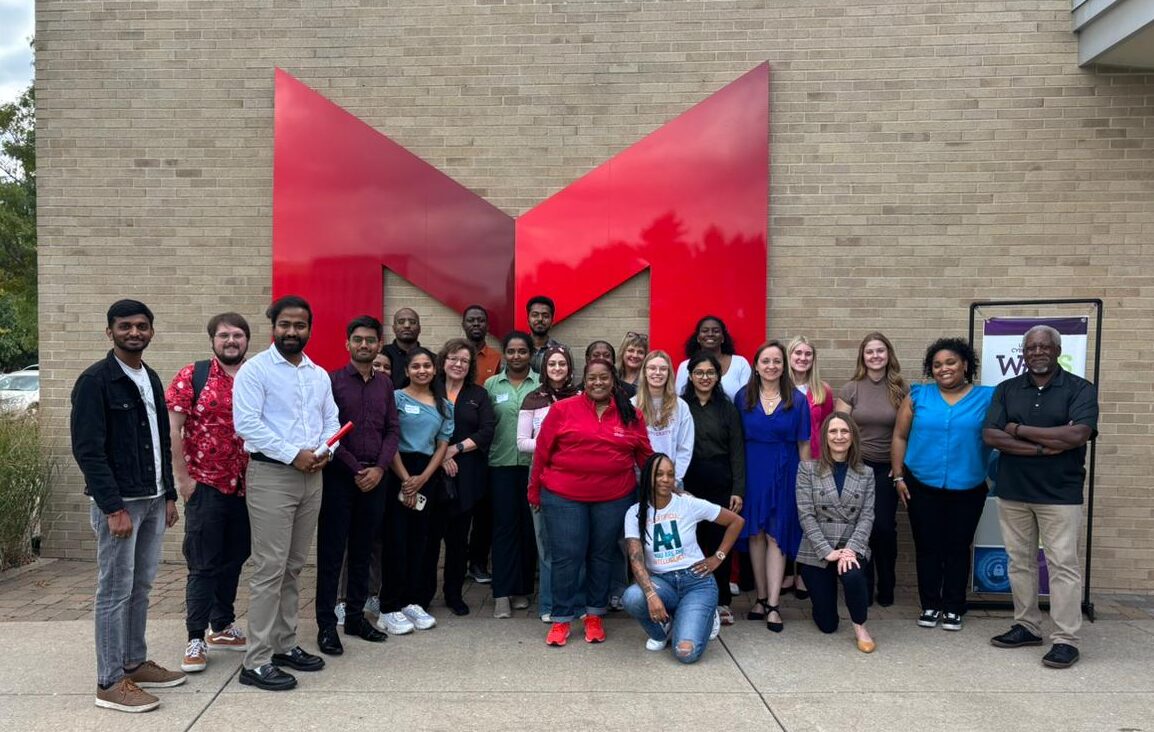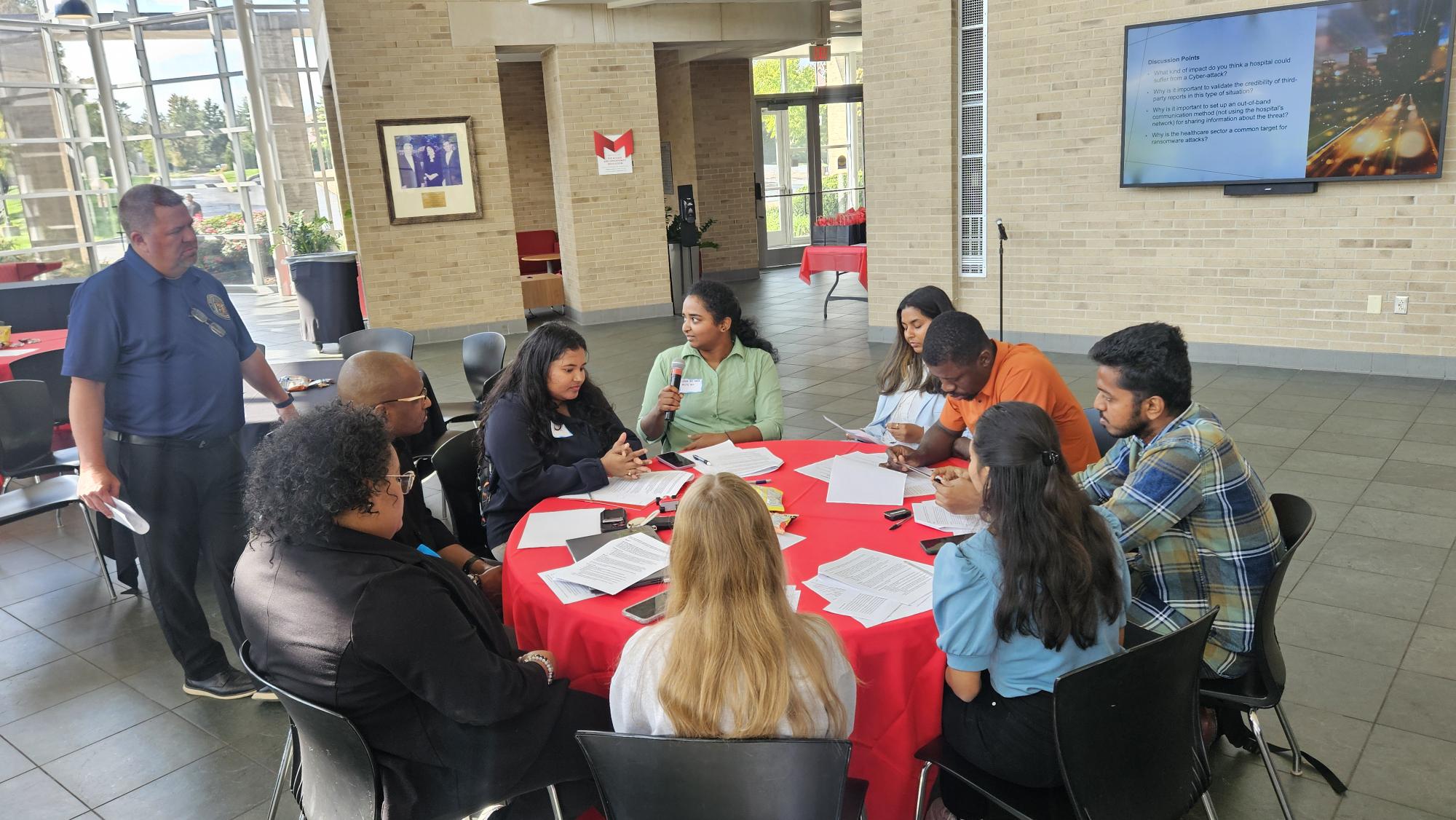
Students from the Maryville University and Saint Louis University (SLU) Women in Cybersecurity (WiCys) chapters are teaming up to address one of the nation’s most critical challenges: the shortage of skilled professionals trained to combat escalating cybersecurity threats.
Students from both universities came together on Oct. 11 for an innovative event – CyberStrong: Building the Cybersecurity Workforce of the Future – where they worked on a tabletop exercise developed by government experts and sponsored by the leading cybersecurity company CrowdStrike. The one-day conference was the first of what the schools hope will become an annual exercise, providing hands-on experience and professional growth opportunities for students.
“What I love about the St. Louis higher education ecosystem is the collaboration, which is like no other in the country,” said Dr. Brian Gant, assistant professor of cybersecurity for the Simon School of Business. “Both Maryville and Saint Louis Universities’ commitment to students is unquestioned as we support our Women in Cybersecurity chapters with a conference fostering mentorship, career pathways, and meaningful engagement.”
This high-impact collaboration also featured a panel discussion hosted by the Global Cybersecurity Center (GCC), a nonprofit that unites senior cybersecurity leaders, including chief information security officers and industry professionals, to tackle the workforce talent gap.
Closing the cybersecurity talent gap is considered critical to effectively defending organizations against ever-evolving cyber threats. The World Economic Forum estimates that there is a global shortage of more than 4 million cyber professionals, and a recent survey showed that women account for less than 20 percent of cybersecurity teams in the U.S.
“This joint event between SLU and Maryville exemplifies how academic collaboration can fuel innovation in both cyber research and defense,” said Maria Weber, director of Cybersecurity and Information Systems Master’s Programs at SLU. “Through the leadership of our WiCyS chapters, we are not only empowering the next generation of cybersecurity professionals, but also providing them with the hands-on experience and interdisciplinary perspective needed to address today’s most pressing digital security challenges.”
 Maryville, which offers cybersecurity degrees at both the bachelor’s and master’s levels, prepares students and professionals to be ethical, adaptable, and socially-responsible cybersecurity leaders in diverse and dynamic business environments through its market-relevant curriculum developed with input from engaged business partners.
Maryville, which offers cybersecurity degrees at both the bachelor’s and master’s levels, prepares students and professionals to be ethical, adaptable, and socially-responsible cybersecurity leaders in diverse and dynamic business environments through its market-relevant curriculum developed with input from engaged business partners.
Ninety-eight percent of Maryville cybersecurity graduates report positive career outcomes and last year, Maryville’s undergraduate cybersecurity program was designated by the National Security Agency (NSA) as a National Center of Academic Excellence in Cyber Defense (CAE-CD). At the Cybersecurity Center of Excellence, students practice and develop workforce-ready skills in cybersecurity, while startups and nonprofit agencies are given cost-free IT security analysis and up-to-date knowledge on compliance requirements.
“By combining Maryville’s strengths in cyber defense with SLU’s focus on cyber research, this unique collaboration bolsters the St. Louis region’s position as a global cybersecurity hub – while giving students the kind of combined hands-on learning experiences they can’t get anywhere else,” said Phyllis Davis, Instructor and Director of Maryville’s Cybersecurity Graduate Program. “We are so grateful to our partners at Women in Cybersecurity, CrowdStrike and the Global Cybersecurity Center for helping bring this unique opportunity to our students and giving them a chance to learn from our nation’s leading cyber defenders and innovators.”
SLU’s Cybersecurity Center, housed within the School for Professional Studies, serves as a hub for cutting-edge cybersecurity education, research, and workforce development. Recognized as a National CAE-CD and DHS, the center emphasizes both technical skill development and ethical leadership. Through a combination of academic programs, including graduate and certificate options and partnerships with industry and government, SLU equips students with practical expertise in areas such as network security, cloud security, digital forensics, and cyber defense. The center’s mission aligns with SLU’s Jesuit values by fostering a secure and just digital society, preparing professionals to protect critical systems and information while upholding integrity and public trust.
“The WiCyS tabletop event gave me so much to think about. I left with new knowledge, new connections, and even more curiosity to keep learning,” said Chloe Davis, a senior at Maryville and the cybersecurity apprentice for Dr. Gant.
“Events like this bring together students from different universities, backgrounds, and experiences, creating a space where diverse voices and perspectives are respected and valued,” said Lenna Maridi, a second-year master’s student in cybersecurity and president of the WiCyS Student Chapter SLU. “They allow students to engage directly with industry professionals, ask questions freely, and receive thoughtful, genuine answers without fear of judgment. This open exchange of ideas encourages inclusion and growth for everyone involved and strengthens the cybersecurity community by fostering mentorship and representation.”
About Maryville University
Founded in 1872, Maryville University is a comprehensive and nationally ranked private institution with an enrollment of well over 9,000 students. Maryville offers over 90 degrees at the undergraduate, master’s and doctoral levels, as well as several certificates that align with the undergraduate and graduate education levels. Maryville is recognized as the third fastest-growing private university in the United States by The Chronicle of Higher Education, serving students from 50 states and 56 countries. More than 50,000 Maryville alumni globally, many of whom work and live in the St. Louis region.
About Saint Louis University
Founded in 1818, Saint Louis University is one of the nation’s oldest and most prestigious Catholic research institutions. Rooted in Jesuit values and its pioneering history as the first university west of the Mississippi River, SLU offers more than 13,300 students a rigorous, transformative education that challenges and prepares them to make the world a better place. As a nationally recognized leader in research and innovation, SLU is an R1 research university, advancing groundbreaking, life-changing discoveries that promote the greater good.